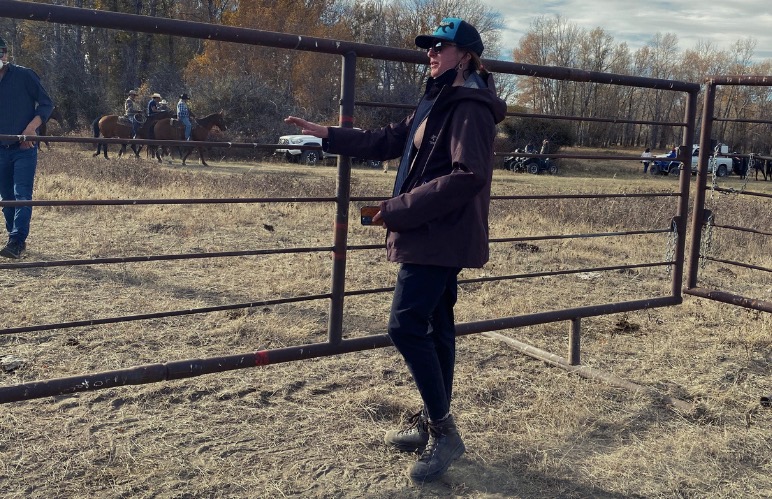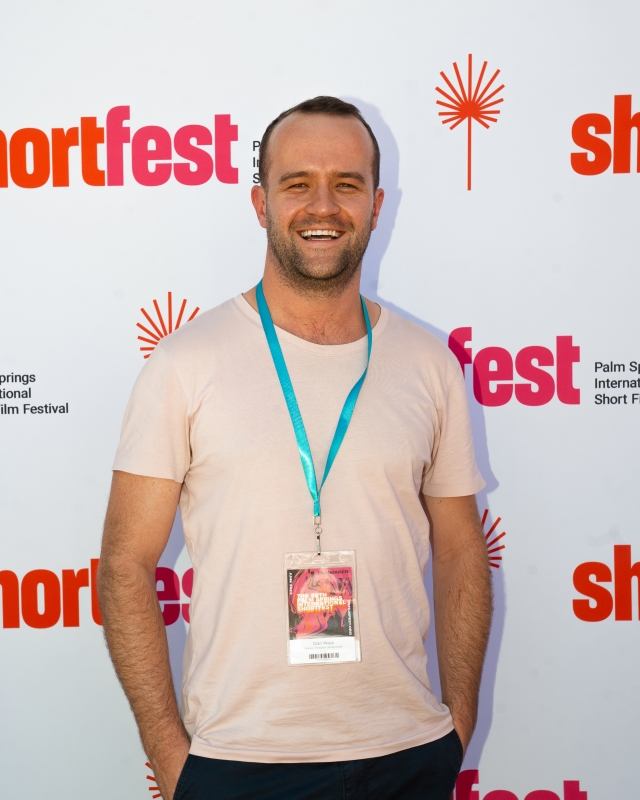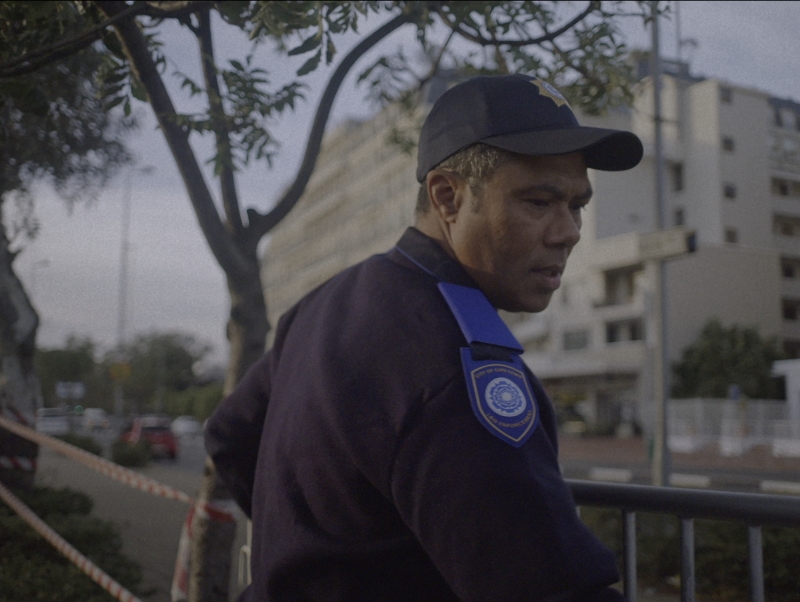|
|
||
|
Pro Tools
FILMFESTIVALS | 24/7 world wide coverageWelcome ! Enjoy the best of both worlds: Film & Festival News, exploring the best of the film festivals community. Launched in 1995, relentlessly connecting films to festivals, documenting and promoting festivals worldwide. Working on an upgrade soon. For collaboration, editorial contributions, or publicity, please send us an email here. User login |
A FUTURE WITHOUT OIL, interview with director Laetitia Moreau
A FUTURE WITHOUT OIL (France, 2010) by French director Laetitia Moreau is a 52’ documentary about President of Ecuador Rafael Correa and his fight with Ecuadorians against mass exploitation of oil from industrialized countries. An Ecuadorian scientific team goes on a three-year mission to raise multi-millions of dollars from US and Europe for a new form of energy development that would be more profitable than oil itself, according to their scientific studies. I interviewed Laetitia in Thessaloniki and we spoke at length on this issue. ME: Can you start by telling us a bit about your film, ‘A Future Without Oil’? Laetitia: I was living in South America. And I heard about this project of protecting the rainforests in Ecuador by not exporting the oil which is in this rainforest and I thought that it was such a crazy idea that if it was true I had to go and see it by myself and maybe make a film. ME: How long did it take you to make? Laetitia: Two years. ME: Was there a lot of footage at the end of filming? Laetitia: Not so much because it was very long to get into the meetings with all the diplomats and all the governments and all the big NGO’s too so that part was a bit complicated. Many times I traveled with the team, the Ecuadorian team, and I wasn’t allowed to film so it was a risky footage in the sense for example I had the authorization of the World Bank to film and then I made all the travel to Washington and when I arrived they told me that the director ofthe section of the World Bank has changed his mind and that he doesn’t want more to be filmed. So, I said ‘that’s not possible!’ So, I made a littlescandal [laughs here]. ME: Oh good! Scandal’s always good! Laetitia: And I said that wasn’t correct and I send an email saying I wasn’t allowed to film. Sorry for my English.. and then we had a negotiation that I can say for 15 minutes. So I did fifteen minutes and then they kicked me out. ME: So, you had meetings in the US then but they were not part of any investment program were they? Laetitia: The part with the government it was no, I couldn’t film anything. But the part with the NGO there was this one sequence where we shoot in the WorldResearch Institute in Washington which is a big think-tank about this climate change problems and a little bit in the World Bank and many associations. Ifilmed a lot but in editing I just kept the crucial part to explain where the difficulties were and so on. ME: So, what drew you to the situation in Ecuador as opposed to other countries? Laetitia: Because from 2006, there is a new president, Rafael Correa, who is, I don’t know if I can say, Socialist.. He’s very progressive and he’s trying tomake social things for the country and ecological policy too so they change a lot the way to see the petrol and the way to see the protection of nature andso on. And they were the first country to vote for the rite for nature and to put that into the constitution. ME: Well, if only more leaders could be like him. He’s very eloquent and educated. Laetitia: Yes, I wanted to say yesterday but I forgot. This man is a PHD graduate, the highest degree you can get, in economy and development and he hashis degree in Harvard in the university of Illinois (USA) and Liège (Belgium). So he’s very clever. ME: And he’s pretty young! Laetitia: And he’s around 40. ME: I like also when you said in the film about when the president went from being an ‘idealist’ to a ‘realist’ during the development of their eco anti-oil project during the course of the film. Laetitia: I’m not sure if their project can be concretized because it’s very difficult. But it’s the first time in international discussion about climatechange that one country proposed something so radical. So, this kind of initiative is just like a stone. Now it’s something new that is beginning. ME: Of Course. And what happens to all the money they raised if they cannot pull this plan off? Laetitia: Well, I think it’s a project where they have to have a new kind of development and that’s the reason why it doesn’t work too because the rich country doesn’t want this kind of development for poor countries. They want poor countries to stay poor. ME: That was going to my next question. How does Europe feel when they weregiving this money to clean up America’s mess? Laetitia: We do the same. The multinationals are from Europe and USA. We share the responsibilities. I wanted to say. There is this movie and there is a webdocumentary and the web documentary is still online and it’s about the Chevron Texaco trial. You heard about this because there was this documentary film byJoel Berlinger. It’s called CRUDE. The web documentary is about the trial because Ecuador is a particularity. The country that have been fighting againstpetrol companies since twenty years it’s Chevron Texaco because of the damage they have done for thirty years with exploitation of Amazon. There is 300,000 people complaining in this trial and the first decision this year in February was favorable to the people of Ecuador. I’m not sure they are going to win but these people have high consciousness about how high is the price to pay to have oil exploitation. ME: Yes, well. The price is our lives. But anyway… I wanted to ask you if you’ve heard of a book call ‘Confessions of an Economic Hit Man’. It’s a very goodbook about how American has crippled poor countries by giving loans they can never pay off and in exchange we keep our infrastructure there so we can drilltheir oil or dig for their riches, etc. And the book is written by a man who did this work for the US. I mean that’s why it’s hard to be a leader like Correa because in the past they have all been assassinated by ‘Economic Hit Men’, so to speak. Laetitia: Yes, there was a coup last September because what Correa is doing is very very difficult. Because there is an oligarchy that is living from the money of the petrol since 40—50 years now and they don’t want any change so they don’t want any social policy, so there is an internal conflict in Ecuador.I didn’t want any money from Ecuador because I wanted to show this conflict. And the interview I made with the president was very clear and I was verydirect. He was very nervous because I had very direct questions. But if our leaders don’t do this kind of thing you can imagine how difficult it is for leadersof poor countries to do this. ME: Yes, well, the leaders of rich countries will do something when it is too late I imagine. Laetitia: Yes, I met the indian economist Pavan Sukhdev in Copenhagen who said ‘when we will be obliged to wear oxygen masks to have to breathe, we willunderstand only then that this is the price". And that’s all the poor people. That’s why I put this at the beginning of the film. To put a price onsome services or stuff or goods that haven’t any value in our world now, but they are important. Without them we can’t live. ME: And the world is so big now we need more oxygen than ever and all the time there is less and less. So, can you tell me, has this film been distributed yet? Laetitia: Yes, this film was screened on TV. I started alone making these but as I was a reporter for many years for Canal Plus. And because I made twodocumentaries for them before this one, I called them, because they are responsible for this one, and I said, ‘okay, nobody wants to buy this film, butyou have to buy it because it is a very good story’. Because we went to Sheffield for example to try to sell it and they said, ‘oh that’s boring. That’s people talking around a table’. But no, I really want that this kind of debate to be known by public also and anybody can make his opinion and ACT…ACT, not only watch TV or watch what is happening in the world And then she bought the film and it was okay because we didn’t need more money to finish the film. ME: And maybe there can be a part 2. Laetitia: I think it was kind of general stuff in that time because we met a lot of Ecuadorian people in the area where there was the exploitation of Texacoand they told us they didn’t know the dangers of the petrol and they saw the danger while the time was passing by. And at the beginning they believedeverything the company was saying. The company was saying that it was just like a medicine so you can drink it or put it on your wounds and the people havecancer and leukemia because of that. Our chauffeur was a formal worker for this company and he explained to us that for many years they put the crude on the roads instead of what we put on roads normally and the people were walking barefoot on this kind of streets so many cancer and many cancers of the skin.So, all this stuff. And this man felt very ashamed. We were two weeks together and he told us he was very ashamed after doing this for many years. You knowhis life was like this for many years but he didn’t know what he was doing. ME: Incredible! Laetitia: And I think that now with some other stuff we are doing the same. In Canada with this toxic gas that we are using now to make energy. It’s the samekind of thing. ME: That’s why it’s so important to make films about these things, so the people can know. We all have so much to learn. How has your film been receivedso far? Laetitia: We have an international distributor in France called ZED and they sold the film so far to Canada, Spain, Switzerland and in France there was anormal screenings with good press and a lot of screenings in the country. It was not for cinema because I made it for tv and it's a very different business, documentary film. And you see that I started with a little money so you see the film it’s not like the images are WOW, no it’s a little film. ME: Well, with documentaries, it’s more the content and subject that are most important. Laetitia: Yes, but in France going through the red of the cinema you have to have something with nice images and nice sound and that’s other kind of work. ME: Well, that’s money. So, where is next for you? Are you going to more festivals with this film? Laetitia: Next week the film goes to Washington but I won’t go to Washington. And the funny thing is that it’s being screened at The World Bank. ME: Wow! Then you should be there. Laetitia: [laughs] I wrote them a letter asking why they don’t invite me but they don’t. I don’t know. I hope that after this festival many people will wantthis film. But not for me. I make a lot of social documentaries for the public TV and I’m very thankful to have this. It’s good and I like it. This was a kind of crazy project in my life and I hope many people can share it and I hope many people keep making films about ecology. ME: And your next project? Laetitia: Yes, it’s about social issues in France. All over France. I don’t know if people from abroad are interested in seeing that but… ME: Well, I’m sure you’re wrong about that. A local issue is a universal one. And then we continued to talk as we walked to our ‘Ouzo’ lunch we had been invited to down the street which consisted of great Greek food and Greek whitewine but no Ouzo. LOL! So, we made up for our lack of Ouzo later at night with hot ouzo and honey, a Thessaloniki specialty called Rakomelo. Thanks Laetitia for your informative very important film and great passion for social and ecological issues that we cannot ignore.
Read more about her film here: http://www.zed.fr/en/catalog/view/144
And see the related film here: www.canalplus.fr Enter: Doc Info: The Challenge.
Interview by Vanessa McMahon, March 17, 2011 21.03.2011 | Vanessa McMahon's blog Cat. : 11:59 A FUTURE WITHOUT OIL Album Amazon America Canada Canal PLus chauffeur Chevron Contact Details Copenhagen Director economist Ecuador energy Entertainment Entertainment Europe food France Harvard http://www.zed.fr/en/catalog/view/144   Human Interest Human Interest Illinois interview with director Laetitia Moreau Laetitia Moreau Music industry Next Magazine oil Pavan Sukhdev Person Career Person Location Person Travel president Quotation Rafael Correa Reporter Sheffield Social Issues Social Issues South America Spain Switzerland Technology Technology Texaco university of Illinois Vanessa McMahon Washington worker World Bank WorldResearch Institute www.canalplus.fr PEOPLE
|
LinksThe Bulletin Board > The Bulletin Board Blog Following News Interview with IFTA Chairman (AFM)
Interview with Cannes Marche du Film Director
Filmfestivals.com dailies live coverage from > Live from India
Useful links for the indies: > Big files transfer
+ SUBSCRIBE to the weekly Newsletter Deals+ Special offers and discounts from filmfestivals.com Selected fun offers
> Bonus Casino
User imagesAbout Vanessa McMahonThe EditorUser contributions |

























 McMahon Vanessa
McMahon Vanessa 


